|
|
|
Sort Order |
|
|
|
Items / Page
|
|
|
|
|
|
|
| Srl | Item |
| 1 |
ID:
141485
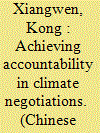

|
|
|
|
|
| Summary/Abstract |
As negotiations for the post-2020 agreement on climate change are underway and expected to be concluded by the end of 2015, the call for ensuring accountability with respect to the implementation of the agreement is attracting increased attention. Hence, one need to have a clear understanding of the meaning of the term “accountability”, particularly as it is used in relation to climate change. Accountability, a term used frequently in politics, is rather new in international law. This paper examines the history of achieving accountability in climate change negotiations, and examines that history under three headings, namely, (1) accountability for historical emissions of developed countries, (2) accountability under the Convention and (3) accountability under the Kyoto Protocol. Through a reflection on past accountability practices, this paper intends to establish that two different modes for achieving accountability have emerged: (1) international legal accountability, and (2) international political accountability. These may well provide useful guides to those involved in crafting the post-2020 agreement. As past practice in climate negotiation has shown, achieving accountability has been fraught with difficulties due to its implications for sanctions or political pressures on a sovereign State. These same concerns would persist in the discussion of the accountability regime for the post-2020 agreement.
|
|
|
|
|
|
|
|
|
|
|
|
|
|
|
|
| 2 |
ID:
114860
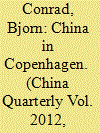

|
|
|
|
|
| Publication |
2012.
|
| Summary/Abstract |
The contradiction between the astonishing dynamic of China's domestic climate policy agenda and its seemingly tenacious position in international climate negotiations presents a puzzle that, on closer inspection, reveals much about a nation at the crossroads, undecided which way to turn. The alterations in China's political interests connected to the issue of climate change are clearly evident in the domestic policy changes China introduced during previous years. However, China's leadership thus far has remained hesitant to translate this new set of interests fully into a coherent position in the international arena. China's mounting difficulties in reconciling its rapidly changing role on the international stage with its altered domestic situation, as well as its traditional foreign policy interests and principles, undermine its ability to pursue a consistent and effective strategy in international climate negotiations. China's reluctance to redefine its role in the international arena has led to a number of inconsistencies that particularly plagued its position during the Copenhagen conference, adding to the overall non-constructive dynamic of the proceedings that ultimately left China, as everyone else, with empty hands. The Copenhagen negotiations demonstrated that China's leadership will have to address these inconsistencies resolutely if it wants to realize the benefits that international climate cooperation offers.
|
|
|
|
|
|
|
|
|
|
|
|
|
|
|
|
| 3 |
ID:
134367
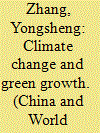

|
|
|
|
|
| Summary/Abstract |
This paper presents a new research agenda on climate change and green growth from the perspective of the division of labor in classical economics. The paper covers three major dimensions of green growth (i.e. carbon emissions, environmental protection and material resources use) and some related important topics, as well as the fresh policy implications of the new research agenda, Typical marginal analysis in a given structure of the division of labor suggests that “green” action is a burden to economic development. Therefore, climate negotiation has become a burden-sharing game and has reached a stalemate. New thinking is badly needed to rescue these negotiations and to drive a shift to a new “green growth” paradigm. The proposed new research agenda represents an effort to create a new narrative on climate change and green growth. Because the new research agenda can theoretically predict the possibility that a more competitive structure of the division of labor could be triggered by “green” policy, it has promising policy implications for various important challenges facing us in the 21st century.
|
|
|
|
|
|
|
|
|
|
|
|
|
|
|
|
| 4 |
ID:
126408
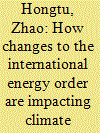

|
|
|
| 5 |
ID:
127525
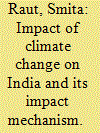

|
|
|
| 6 |
ID:
153185
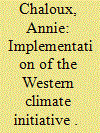

|
|
|
|
|
| Summary/Abstract |
The Western Climate Initiative is internationally recognized as a success story in global climate negotiations. However, between the first expression of the idea of a cap-and-trade system in 2007 and the launch of carbon trading in 2013, the number of participating Canadian provinces and US states fell from 11 to 2, and important hurdles risked derailing the project completely. The trajectory of this innovative cross-boundary policy holds important lessons for the prospects and pitfalls of green paradiplomacy in North America. This paper examines the impetus for subnational efforts to combat climate change in the face of federal inaction, and, through detailed examination of the WCI, looks at jurisdictional, administrative, legal, political, social and economic factors that complicate the implementation of these initiatives. The analysis enables a better understanding of prospects for the establishment of norms, rules and institutions among North American federated states that can provide durable environmental regimes.
|
|
|
|
|
|
|
|
|
|
|
|
|
|
|
|
| 7 |
ID:
185657
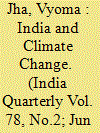

|
|
|
|
|
| Summary/Abstract |
Climate change emerged as a serious diplomatic concern for India in the early 1990s. India has since been a staunch champion of the developing world, in multilateral climate negotiations; from playing a key role in establishing the principle of common but differentiated responsibility and respective capabilities, to forging alliances with countries with shared developmental concerns. Faced with the growing impact of climate change and changing geopolitics, India’s foreign policy on climate change has undergone significant shifts during two decades of multilateral climate talks. First, India’s willingness to undertake domestic climate action as a result of its changing economic status and, second, the role of the political leadership—since Prime Minister Narendra Modi came to power in 2014—in shaping the climate discourse both in the country and abroad. India has, in recent years, shed its defensive, naysayer strategy at climate negotiations and led several multilateral initiatives for climate action. As India celebrates 75 years of its Independence, it is forging a new, confident leadership on issues of climate change. While there is continuity in India’s traditional stance on finance and technology transfer during negotiations, Indian foreign policy has begun to display a marked change in the strategic use of climate change to assert greater power on the global stage.
|
|
|
|
|
|
|
|
|
|
|
|
|
|
|
|
| 8 |
ID:
129050
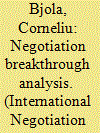

|
|
|
|
|
| Publication |
2014.
|
| Summary/Abstract |
The article addresses an important gap in the literature on climate negotiations, namely, the question of breakthroughs: what exactly counts as breakthroughs in climate negotiations, how do you measure them empirically, and what practical implications do they have for the negotiation process? To address these questions, the article draws on market trading theory and develops a framework of negotiation breakthrough analysis for defining, recognizing and measuring negotiation breakthroughs. The article argues that breakthroughs in climate negotiations occur when the outcomes breach the resistance or support level of parties' expectations regarding the results of climate talks. It concludes with a discussion of the broader contributions that technical analysis can make to the theory and practice of international negotiations.
|
|
|
|
|
|
|
|
|
|
|
|
|
|
|
|
| 9 |
ID:
125483


|
|
|
|
|
| Publication |
2013.
|
| Summary/Abstract |
This short communication presents a synthesis of a Working Group on Carbon Emission Policy and Regulation held at the University of Sao Paulo, in Brazil. The document looked at the problems with the international negotiations, the options for Brazil as it attempts to control emissions, and ways to leverage the mitigation process. Several options are currently being proposed, but these are neither clear in order to support a solid polycentric approach with adequate metrics, nor a robust international coordination and a sound scientific communication. Brazil has a central role in this process, for having successful initiatives on renewable energy and deforestation control. Its leadership can demonstrate how such policies might take shape. However, the country´s future is uncertain in terms of low carbon development. Although the country is still well positioned among BRICS to find practical solutions to the stalemate in international cooperation, several internal challenges need to be harmonized.
|
|
|
|
|
|
|
|
|
|
|
|
|
|
|
|
| 10 |
ID:
143241
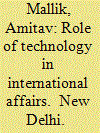

|
|
|
|
|
| Publication |
New Delhi, Pentagon Press, 2016.
|
| Description |
xii, 260p.hbk
|
| Standard Number |
9788182748811
|
|
|
|
|
|
|
|
|
|
|
|
Copies: C:2/I:0,R:0,Q:0
Circulation
| Accession# | Call# | Current Location | Status | Policy | Location |
| 058459 | 327.1054/MAL 058459 | Main | On Shelf | General | |
| 058460 | 327.1054/MAL 058460 | Main | On Shelf | General | |
|
|
|
|
| 11 |
ID:
148720
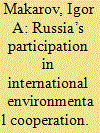

|
|
|
|
|
| Summary/Abstract |
While environmental issues attract growing interest all over the world Russia has kept aside from this trend for a long time. Its participation in international environmental cooperation has always been determined primarily by the external policy’s objectives. In Soviet times, participation in global environmental initiatives was a channel of collaboration with the West. In the 1990s, it was a means of integration into the international community and one of the major areas of cooperation with the US. In the 2000s, Russia used the environmental agenda for gaining trade-offs from Western partners along with attraction of foreign investment. At present, the understanding of possibilities to reap benefits from the country’s natural capital is strengthening among Russian political and business elites. As a result, Russia’s involvement in international environmental cooperation may stir up in the near future.
|
|
|
|
|
|
|
|
|
|
|
|
|
|
|
|
| 12 |
ID:
172980
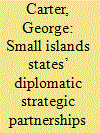

|
|
|
|
|
| Summary/Abstract |
George Carter examines the efforts of small Pacific states to lessen their vulnerability to global climatic dynamics.
|
|
|
|
|
|
|
|
|
|
|
|
|
|
|
|
| 13 |
ID:
090038


|
|
|
|
|
| Publication |
2009.
|
| Summary/Abstract |
Russia's European security initiative, aimed mainly at consolidating military security, has received a mixed reaction in the West. Nevertheless, in the course of future talks, it should be taken into account that the EU countries and the U.S. (especially with the B. Obama administration) give a broad interpretation to the security concept, including not only "tough" but also "soft" security.
|
|
|
|
|
|
|
|
|
|
|
|
|
|
|
|
| 14 |
ID:
177663
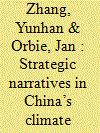

|
|
|
|
|
| Summary/Abstract |
During the past decade, we have witnessed a transformation in the role played by China in international climate negotiations, which has provoked increasing academic and policy interest. While most of the current research focuses on normative or empirical analyses of policies, this article provides a comprehensive study of China’s climate strategic narratives on both the systematic and national levels. Theoretically, this article situates itself in the ‘narrative turn’ in international relations. We develop an analytical framework that combines theoretical insights stemming from the strategic narrative with our own identification of the unique features of China’s discourse context. We apply this to China’s climate strategic narratives by examining China’s climate ‘discourse coalition’, which consists of the government, the epistemic community, and the official media. In doing so, we add to the current research that mainly focuses on the mass media. Methodologically, we critically examine four different sources of China’s climate strategic narratives, ranging from leaders’ speeches to media reports. This data is triangulated with 21 semi-structured interviews. Overall, we identify three phases of China’s climate strategic narratives. On a system level, the strict division between developed and developing countries has been replaced by the narrative of ‘a community of a shared future of mankind’; while on the national level, China as the victim of ‘ecological imperialism’ has given way to the new ‘torchbearer’ narrative. This research also contributes to a broader understanding on China’s domestic politics and its position in global governance.
|
|
|
|
|
|
|
|
|
|
|
|
|
|
|
|
| 15 |
ID:
110830


|
|
|
|
|
| Publication |
2012.
|
| Summary/Abstract |
According to two-level game theory, negotiators tailor agreements at the international level to be ratifiable at the domestic level. This did not happen in the Kyoto negotiations, however, in the US case. We interviewed 26 German, Norwegian, and US participants in and observers of the climate negotiations concerning their views on three explanations for why the United States did not become a party to Kyoto. Explanation 1 argues that Kyoto delegations mistakenly thought the Senate was bluffing when adopting Byrd-Hagel. Explanation 2 contends that Europeans preferred a more ambitious agreement without US participation to a less ambitious agreement with US participation. Finally, explanation 3 suggests that in Kyoto the Clinton-Gore administration gave up on Senate ratification, and essentially pushed for an agreement that would provide them a climate-friendly face. While all explanations received some support from interviewees, explanation 1 and (particularly) explanation 3 received considerably more support than explanation 2.
|
|
|
|
|
|
|
|
|
|
|
|
|
|
|
|
|
|
|
|
|